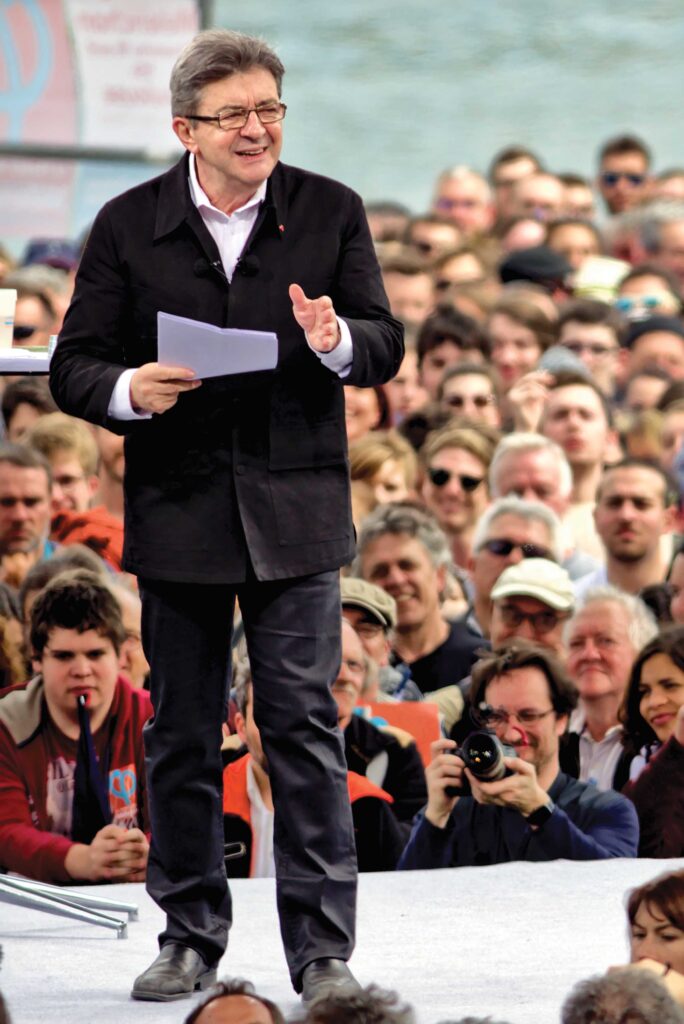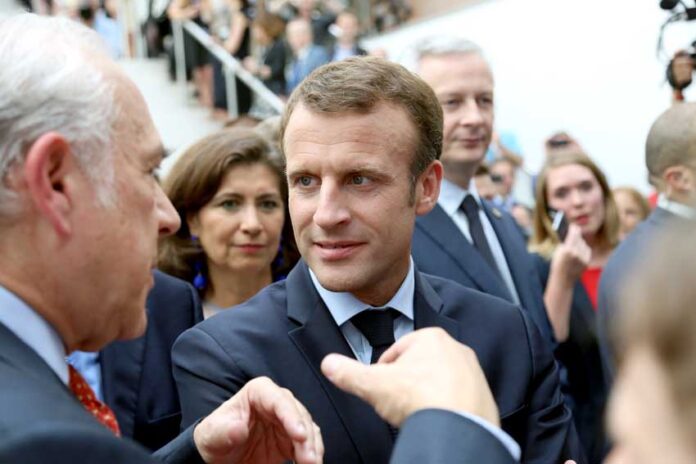Leïla Messaoudi, General secretary of Gauche Révolutionnaire (CWI, France)
Anger at rising prices, record profits for French multinationals and shareholders, the destruction of public services, reduced rights of the unemployed, and ongoing strikes over wages for several months… As in the rest of the world, instability is the rule in France.
President Emmanuel Macron’s last five years in office are synonymous with heightened social tensions: the ‘Gilets Jaunes’ (Yellow Vests) movement, movements for more social justice, mobilisations against the pension reform in 2019, and more besides
The Covid crisis has, for a time, anaesthetised the struggles. Using the pandemic and unable to protect the population, Macron preferred to impose a very repressive state of health emergency during the first lockdown.
The aforementioned struggles did not lead to a decisive victory against Macron and the capitalists, even though the government was forced to back down temporarily on the pensions attack. And on the political front, no party or political force has mobilised a coordinated opposition of workers and the general population against these policies.
Only France Insoumise (FI), with its 17 deputies (MPs) in the National Assembly, and its leader, Jean-Luc Mélenchon, has represented a consistent opposition to Macron.
What does Macron want?
Macron officially announced his candidacy for the presidency at the end of February, just six weeks before the first round of the election, which will be on 10 April. The war in Ukraine serves as a justification for not campaigning and for saying his re-election is a foregone conclusion.
On 18 March, Macron announced his fighting programme for the interests of the bosses! He wants later retirement at 65, compulsory work for those receiving minimum social benefits, dismantling the national education system by attacking the status of teachers and then others, a refocusing on leading sectors of energy supply (nuclear), and so forth. The same programme as the traditional right!
The capitalists thus have in Macron the political representative of their class and intend to keep him for another five years. The bourgeois (capitalist) parties, initially of the classical right, like Sarkozy’s Les Républicains or the ‘bourgeoisified’ Socialist Party (SP) of François Hollande and Anne Hidalgo, have collapsed for the moment. Indeed, little or nothing in their programme distinguishes them from Macron and his policies.
From the point of view of the election itself, Macron is hoping for a second round with Marine Le Pen, which would see him elected hands down. There is little chance that Le Pen’s RN (‘National Rally’, previously the National Front) can win. Its profile has not been able to develop over the last five years.
The nationalist right and the far-right have dominated the beginning of the election with a virulent anti-immigration campaign. But rising prices and the cost of living came back to the centre of the debate. The social issues remain central.
The right and the far-right are in crisis and are regrouping around Eric Zemmour, the racist, sexist, ultra-free-market politician. Le Pen is on the other wing, along with the Republicans.
How to fight back
The challenge is for workers and young people, who are most aware of the issues, to be able to express their own views as clearly as possible. We must have a vote against Macron and the capitalists, the right and the far-right, but also a vote that breaks with all the policies carried out on behalf of the capitalists by the PS and the Greens in government and in the local regions and departments.

On the political left, Jean-Luc Mélenchon of France Insoumise-Union Populaire is standing again. In the first round of the 2017 presidential election he won 19.6% of the vote, only narrowly failing to contest the second round against Macron.
Mélenchon is the only candidate capable of playing a central role in reaching those among the working classes who want to fight Macron, but also the growing number of voter abstainers.
On the basis of his ‘Common Future’ programme, Mélenchon has succeeded in bringing together activists from social movements, organisations and parties in a grouping called ‘The Popular Union’ (Gauche Révolutionnaire – Revolutionary Left – is part of the Parliament of the People’s Union and has been building France Insoumise since 2017).
Registering between 13% and 15% in the polls, Mélenchon is in third spot, just behind Le Pen, and Macron, who is leading. Mélenchon is now ahead of Zemmour, who is losing points, and Valérie Pécresse of the right-wing Republicans. He leaves the Green and PS candidates far behind.
The PCF (French Communist Party), unfortunately, has chosen to go it alone this time, essentially to continue to exist, and its candidate is polling around 4% to 5%.
This is not insignificant, and shows the potential of a single FI-PCF candidate. The PS, on the other hand, is hitting an all-time low of 2%-3%, at the same level as the NPA (New Anticapitalist Party) of Philippe Poutou and Olivier Besancenot, who are also running, as well as Lutte Ouvrière (Workers’ Struggle).
Combative programme
Mélenchon’s programme calls for: freezing prices, expanding public services, creating real jobs and raising wages. These are the crucial pillars of the programme.
The only force capable of carrying out these measures is the working class through the establishment of a workers’ government. But ‘Common Future’ only goes halfway. It fails to deal with how to change society and end capitalism, and why we have to fight for a socialist society.
For these reasons, Gauche Révolutionnaire’s campaign to support the candidacy of Mélenchon, in France Insoumise, and also with our own material, seeks to go further on certain demands by fighting for: the state monopoly of public health services, renationalisation under workers’ control; decent jobs for all; an increase in the minimum wage; pensions and wages; retirement at 60; increased resources for public services; the renationalisation of Energie de France and Engie; and of the railways.
We also have disagreements, such as on international issues, and the illusions that Mélenchon has in international capitalist institutions, and on a supposedly historic role for France abroad.
In the streets, in the door-to-door campaigns, and in the workplaces, campaigning for Mélenchon largely facilitates political discussion around the ways of combating the capitalists. These also provide the basis for discussion about the role that a genuine mass workers’ party for socialism could have in the next period.
As Mélenchon’s latest poster says, ‘another world is possible!’ We say yes, a socialist world is necessary!
Committee for a Workers’ International (CWI)
The Committee for a Workers’ International (CWI) is the international socialist organisation which the Socialist Party is affiliated to. The CWI is organised in many countries. We work to unite the working class and oppressed peoples against capitalism, and to fight for a socialist world.








